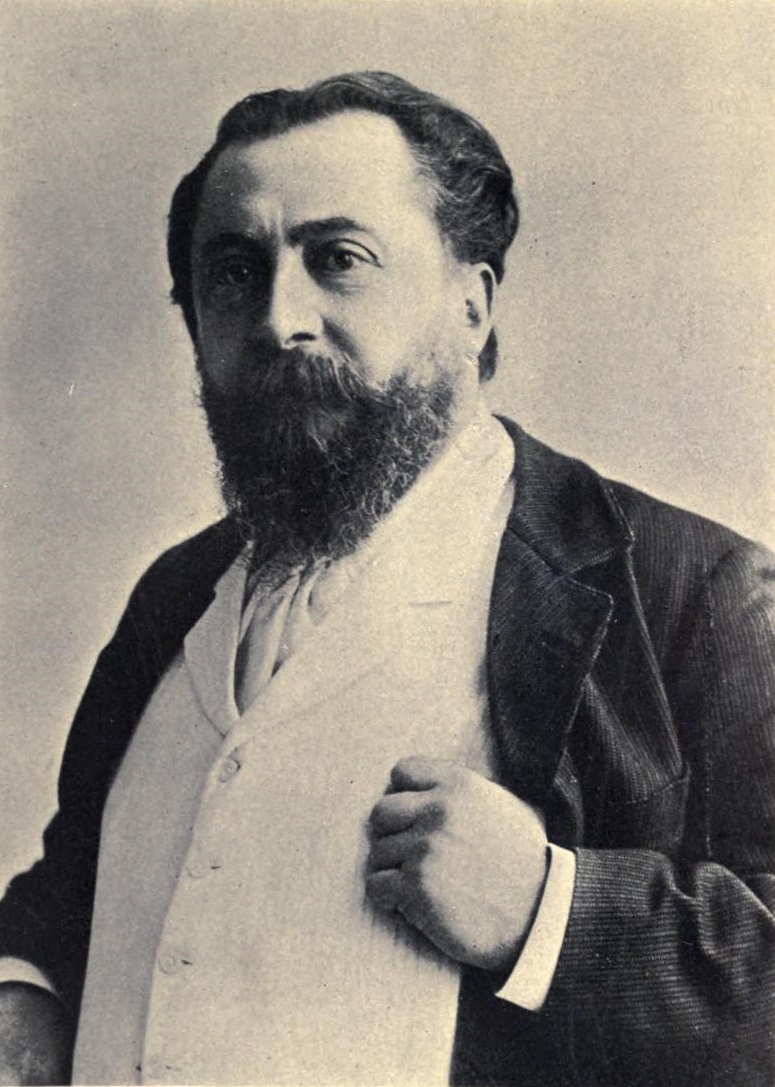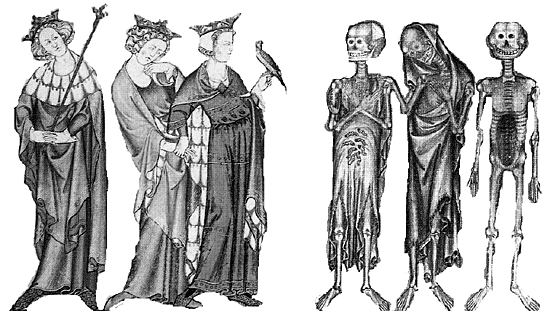
Catulle Mendès ( 1841 – 1909)
Catulle Mendès was a French poet and man of letters.
Of Portuguese Jewish extraction, Mendès was born in Bordeaux.
After childhood and adolescence in Toulouse, he arrived in Paris in 1859 and quickly became one of the proteges of the poet Théophile Gautier.
He promptly attained notoriety with the publication in the La Revue fantaisiste (1861) of his Roman d'une nuit, for which he was condemned to a month's imprisonment and a fine of 500 francs. He was allied with Parnassianism from the beginning of the movement and displayed extraordinary metrical skill in his first volume of poems, Philoméla (1863).
His critics have noted that the elegant verse of his later volumes is distinguished rather by dexterous imitation of different writers than by any marked originality. The versatility and fecundity of Mendès' talent is shown in his critical and dramatic writings, including several libretti, and in his novels and short stories.
His short stories continue the French tradition of the licentious conte.

There was once a kingdom where mirrors were unknown. They had all been broken and reduced to fragments by order of the queen, and if the tiniest bit of looking-glass had been found in any house, she would not have hesitated to put all the inmates to death with the most frightful tortures.
Now for the secret of this extraordinary caprice. The queen was dreadfully ugly, and she did not wish to be exposed to the risk of meeting her own image; and, knowing herself to be hideous, it was a consolation to know that other women at least could not see that they were pretty.
You may imagine that the young girls of the country were not at all satisfied. What was the use of being beautiful if you could not admire yourself?
They might have used the brooks and lakes for mirrors; but the queen had foreseen that, and had hidden all of them under closely joined flagstones. Water was drawn from wells so deep that it was impossible to see the liquid surface, and shallow basins must be used instead of buckets, because in the latter there might be reflections.
Such a dismal state of affairs, especially for the pretty coquettes, who were no more rare in this country than in others.
The queen had no compassion, being well content that her subjects should suffer as much annoyance from the lack of a mirror as she felt at the sight of one.
However, in a suburb of the city there lived a young girl called Jacinta, who was a little better off than the rest, thanks to her sweetheart, Valentin. For if someone thinks you are beautiful, and loses no chance to tell you so, he is almost as good as a mirror.
“Tell me the truth,” she would say; “what is the color of my eyes?”
“They are like dewy forget-me-nots.”
“And my skin is not quite black?”
“You know that your forehead is whiter than freshly fallen snow, and your cheeks are like blush roses.”
“How about my lips?”
“Cherries are pale beside them.”
“And my teeth, if you please?”
“Grains of rice are not as white.”
“But my ears, should I be ashamed of them?”
“Yes, if you would be ashamed of two little pink shells among your pretty curls.”
And so on endlessly; she delighted, he still more charmed, for his words came from the depth of his heart and she had the pleasure of hearing herself praised, he the delight of seeing her. So their love grew more deep and tender every hour, and the day that he asked her to marry him she blushed certainly, but it was not with anger. But, unluckily, the news of their happiness reached the wicked queen, whose only pleasure was to torment others, and Jacinta more than anyone else, on account of her beauty.
A little while before the marriage Jacinta was walking in the orchard one evening, when an old crone approached, asking for alms, but suddenly jumped back with a shriek as if she had stepped on a toad, crying: “Heavens, what do I see?”
“What is the matter, my good woman? What is it you see? Tell me.”
“The ugliest creature I ever beheld.”
“Then you are not looking at me,” said Jacinta, with innocent vanity.
“Alas! yes, my poor child, it is you. I have been a long time on this earth, but never have I met anyone so hideous as you!”
“What! am I ugly?”
“A hundred times uglier than I can tell you.”
“But my eyes”
“They are a sort of dirty gray; but that would be nothing if you had not such an outrageous squint!”
“My complexion”
“It looks as if you had rubbed coal-dust on your forehead and cheeks.”
“My mouth”
“It is pale and withered, like a faded flower.”
“My teeth”
“If the beauty of teeth is to be large and yellow, I never saw any so beautiful as yours.”
“But, at least, my ears”
“They are so big, so red, and so misshapen, under your coarse elf-locks, that they are revolting. I am not pretty myself, but I should die of shame if mine were like them.” After this last blow, the old witch, having repeated what the queen had taught her, hobbled off, with a harsh croak of laughter, leaving poor Jacinta dissolved in tears, prone on the ground beneath the apple-trees.
-----
Nothing could divert her mind from her grief. “I am ugly, I am ugly,” she repeated constantly. It was in vain that Valentin assured and reassured her with the most solemn oaths. “Let me alone; you are lying out of pity. I understand it all now; you never loved me; you are only sorry for me. The beggar woman had no interest in deceiving me. It is only too true, I am ugly. I do not see how you can endure the sight of me.”
To undeceive her, he brought people from far and near; every man declared that Jacinta was created to delight the eyes; even the women said as much, though they were less enthusiastic. But the poor child persisted in her conviction that she was a repulsive object, and when Valentin pressed her to name their wedding day “I, your wife!” cried she. “Never! I love you too dearly to burden you with a being so hideous as I am.” You can fancy the despair of the poor fellow so sincerely in love. He threw himself on his knees; he prayed; he supplicated; she answered still that she was too ugly to marry him.
What was he to do? The only way to give the lie to the old woman and prove the truth to Jacinta was to put a mirror before her. But there was no such thing in the kingdom, and so great was the terror inspired by the queen that no workman dared make one.
“Well, I shall go to Court,” said the lover, in despair. “Harsh as our mistress is, she cannot fail to be moved by the tears and the beauty of Jacinta. She will retract, for a few hours at least, this cruel edict which has caused our trouble.”
It was not without difficulty that he persuaded the young girl to let him take her to the palace. She did not like to show herself, and asked of what use would be a mirror, only to impress her more deeply with her misfortune; but when he wept, her heart was moved, and she consented, to please him.
---
“What is all this?” said the wicked queen. “Who are these people? and what do they want?”
“Your Majesty, you have before you the most unfortunate lover on the face of the earth.”
“Do you consider that a good reason for coming here to annoy me?”
“Have pity on me.”
“What have I to do with your love affairs?”
“If you would permit a mirror”
The queen rose to her feet, trembling with rage. “Who dares to speak to me of a mirror?” she said, grinding her teeth.
“Do not be angry, your Majesty, I beg of you, and deign to hear me. This young girl whom you see before you, so fresh and pretty, is the victim of a strange delusion. She imagines that she is ugly.”
“Well,” said the queen, with a malicious grin, “she is right. I never saw a more hideous object.”
Jacinta, at these cruel words, thought she would die of mortification. Doubt was no longer possible, she must be ugly. Her eyes closed, she fell on the steps of the throne in a deadly swoon.
But Valentin was affected very differently. He cried out loudly that her Majesty must be mad to tell such a lie. He had no time to say more. The guards seized him, and at a sign from the queen the headsman came forward. He was always beside the throne, for she might need his services at any moment.
“Do your duty,” said the queen, pointing out the man who had insulted her. The executioner raised his gleaming axe just as Jacinta came to herself and opened her eyes. Then two shrieks pierced the air. One was a cry of joy, for in the glittering steel Jacinta saw herself, so charmingly pretty, and the other a scream of anguish, as the wicked soul of the queen took flight, unable to bear the sight of her face in the impromptu mirror.


No comments:
Post a Comment